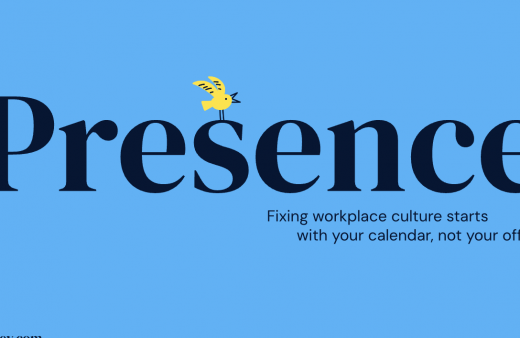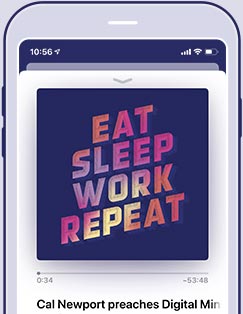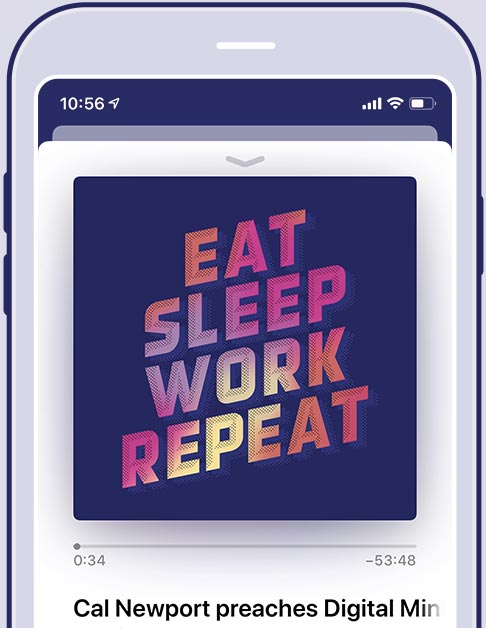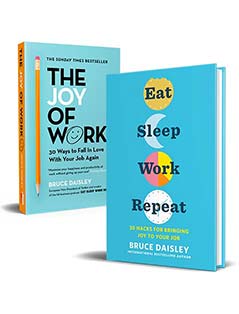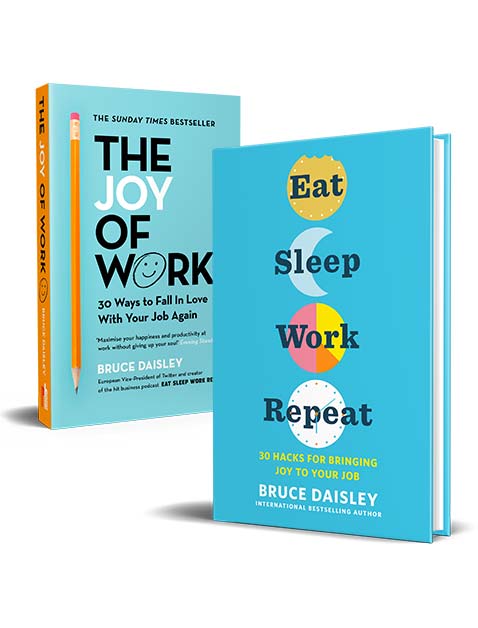Why Your Open Plan Office is a Mistake
Andre Spicer is a professor in organisational behaviour at Cass Business School. He’s written about the disfunction of world places and the advent of ‘organisational stupidity’.
Full transcript:
- A commute of over 30 minutes correlates with unhappiness (can you let long commuters work in a different way?)
- Is your boss nice to you?
- Do you have autonomy over your work?
- Open plan alone isn’t enough for an office – you need quiet spaces too. Open plan is bad even for collaboration
- Don’t blur the lines between work & home it can actually lead to exhaustion
- “If you want to change your behaviour change the environment around you”
I thought your work was really stimulating because of all the discussions I’ve been having to date, your work is the counterpoint to it. I think the one thing that probably runs through all of my preconceptions are my imaginings before was, to this Albert Schweitzer quotation that you gave that, he says “Success is not the key to happiness. Happiness is the key to success”. And so you know that’s an interesting idea. You’re more successful if you’re more happy. And I guess that was my notion when I entered this and your work really takes issue with it doesn’t it.
ANDRE SPICER: Yeah sure. So if we look at kind of distribution of happiness what we see we know is this curve which shows that basically money actually does equal happiness up to a certain level. Right. And afterwards it sort of sort of plateaus off a little bit. But what we’re trying to point out is this idea that if you somehow get to convince yourself and make yourself more happy somehow by hiring a life coach or doing mindfulness meditation or whatever intervention you might find that you’re suddenly going to become more successful in your life.
Well unfortunately that’s not the case. So there are many interventions which we see which tried to aim at making people more happy and often all it does is end up making them feel either more miserable or guilty that they’re not being more successful. So let me give you an example of the more miserable. There was a really interesting study done which was about maybe 10 or 15 years ago. And some psychologists essentially gave people a piece of music which should normally make people quite happy and they told one group ‘Okay listen to this piece of music and pay attention to how happy you’re getting, it’s a very happy piece of music you should get happy by doing it’. The second group they gave them the music and said ‘listen to it’. Then they measured the before and afterwards about whether they were happy with the music and what they found was the group that was told pay attention to the music and make yourself more happy by doing it actually became more miserable after listening to the music and the other group who weren’t told to be more happy became more happy. So what this begins to point towards is that if we’re constantly told in our life ‘be more happy, focus on the good stuff in your life, la la la’.
What you often end up doing is missing the things which actually genuinely make you happy. So sometimes this over attention we give to happiness I guess draws out, it means that we end up finding the things which would normally make us happy actually end up becoming something which is embittering. Maybe that should have made me more happy, or something like that. So that’s the first point. The second point is this relationship between happiness equals success. What we’ve seen in the last 10 years, we’ve had the Great Depression and one of the reactions strangely enough of our policymakers but also corporations as they were firing people as the government was cutting back on welfare etc. was to say okay we’re not going to give you anything but what we can give you as a life coach. And if you can increase your happiness rating then that’s great. So it seems that people aren’t being given a pay rise or better work conditions or in the case of government services basic government services will cut all those things or do you get now as a life coach and you get a boost in happiness and most of the time that doesn’t happen. And the weird thing is there is that if we take it back to the workplace what we know is that the actual major causes of happiness at work aren’t necessarily having an upbeat attitude, life coach all that sort of stuff. It’s actually just the design of the work itself. Right. So do you feel like you have autonomy over your work as your boss you know fairly nice to you. Do you feel like you’re doing something purposeful. Those things are what makes the happiness it’s not you have half an hour one hour time week to do some mindfulness meditation. So I think changing the structure of work is what’s more likely to make people more happy.
It’s almost like happiness should never be the goal of the company. Is that is that what you’re basically saying or it shouldn’t be directly the goal. So you shouldn’t be trying to do things you should be more thinking what are the components of the job that might correlate with people being more motivated or happy. But don’t don’t set out to do those things.
ANDRE SPICER: So the basic idea is that if you set out to get happy it’s likely you’re going to end up more miserable.
Often happiness is something which you find obliquely right. So let’s just take an idea that you’re going to go for a walk, walk up to the top of a hill and it’s a beautiful day if you’re constantly thinking how happy you might get. My goal is happiness of walking up here. It’s likely that you’re not going to find that particularly happiness-inducing. However if you say. Get to the top of the mountain then it’s likely along the way you might see a beautiful vista and then you might surprise yourself. I’m happy here. The English economist John Kay makes this point. He talks about Obliquity, so obliqueness. We often achieve the greatest goals in our life (which might be say happiness if we think that’s important) obliquely. We find it by not expecting it. So maybe the times you have experienced happiness in the last week or so might have been not what you were planning for it but it came about in another way. So I guess it’s thinking about what would obliquely make us happy. And if you begin looking at the science on this topic what you’ll find is that stuff like commuting distance. So for instance if your commuting distance goes over around about 30 minutes a day your happiness rating shoots down.
It’s things like work-stress, having less autonomy at work. It’s things like provision of public services. If you’re in a very competitive environment, you’re seeing other people around you who are far better or worse off than you it’s likely your happiness ratings are going to go down. So it’s all of these things which aren’t necessarily about mindset but more the kind of context around you which is likely to make you less or more happy. I mean we know that for instance depression is one of the major drivers of unhappiness and that’s linked with all of these other things rather than just mindset.
And you touched on one thing there I wanted to briefly cover so in one of your books you talk about mindfulness and we’ve mentioned mindfulness there. You say that mindfulness has become this thing that we feel bad if if someone tells us that they’re spending time meditating they’re doing mindfulness, we feel bad that we’re not doing that. And you say really explicitly mindfulness is bad science. There’s no correlation with mindfulness and any reduction in absenteeism or anyone feeling more fulfilled in their work.
ANDRE SPICER: Well so mindfulness there’s actually a lot of research which shows mindfulness is good for certain individual things. So anxiety for instance or ability to focus on a task for a significant period of time. Yeah there’s good evidence about that even even for instance in the one area I teach is in corporate social responsibility and what we find there is that one of the only few ways you can actually change people’s ethical orientation is to put them in mindfulness training – strangely – in a course. But if you want to say OK I want to transform my company as a whole by giving people an hour or half an hour of mindfulness every day that ain’t gonna happen. There’s not a lot of evidence for it but there is evidence about individual level stuff. So just if I take myself at the end of just today handing in a large book manuscript. A very stressful time for my myself and my co-author and a few nights ago I sat down and that 15 minutes of mindfulness. And I felt more focussed and better and less anxious for it. But if I was forcing my whole company to do that that’s not necessarily going to mean the whole company transforms. So it’s made meaning that individual level transformations might make a difference for the individual but it’s not going to save your whole company.
Maybe if I can just one give you one small example of that. I remember sitting on a panel once where there was a woman from the Department of Health there. The Department of Health is as you know constantly going through changes and it’s under huge pressure and basically most people who are quite senior they’re off on stress leave and so forth. because you know they have no control because a politician comes in charge and they change things all the time. And she went off on long term stress leave and then she came back and she’d found mindfulness meditation and it really made a difference to her life. Fantastic. But then she thought okay I’ll provide this. And people would go along after work. And that’s also great. But then this idea that you can somehow completely transform a government department by introducing half an hour of mindfulness and mindfulness after work so it means you’re staying for an hour after work while still having an extremely stressful day. It’s not going to happen. What you should do if you really want to make more work more mindful is not add half an hour of mindfulness practice. Actually think about starting to make the work process itself more mindful. So let me give you an example of that. If we think about say open plan offices, what that does, sometimes it’s great for communication but mostly data suggests that people just get distracted, they get more ill, they find they’re more stressed, there’s more absenteeism – all of these kind of things if you have flex work desks or open plan workspaces because they’re getting interrupted.
Now if you do a survey and ask people why did you have a good day today or not. This is what the Harvard Business School did recently. The number one thing which comes out of people saying they had a good day at work is when they were able to sit down for some period of time and focus on a task which they found meaningful, important etc and make some progress on – it is that simple. If you think about the way we design our workplaces. It’s like constant interruptions like e-mails all the time and social media, and boss coming by, and co-worker coming by and bugging you and another meeting you’ve got go to it it’s pointless. What if we actually thought about redesigning work? It gave us just a little periods of time we’re actually able to focus on our work. And when you go get into that and you’re you know if you see your work as meaningful you then have this kind of flow state experience which people kind of aim for a little bit with mindfulness. Hey presto you’re actually finding your work as being a bit more focussed rather than this disjointed and unconnected experience that most people have in the kind of work places we work in often.
Fascinating that that would lead to a redesign of most contemporary office spaces, right?
ANDRE SPICER: Yeah absolutely. I mean so we’ve been labouring under this illusion that the open plan flex work environment, that looks like a kind of loft that’s being taken over by some artists is the best way to organise stuff. No. Most of the evidence suggests that open plan workplaces are actually really bad even for collaboration. There was a study done, I actually had a student who was doing a study looking at a pharmaceutical company and basically they were had drug developers.
One floor was like lab lab lab where they had their own labs. The second floor they developed open labs. And what they found is that basically the amount of communication between people when they develop this open lab was supposed to go up and it actually went down. So people don’t they communicate less often when they were in the open workspaces.
I wonder if we’ve conflated hierarchical systems. And so it felt like the big office was the sign of what the boss had. And so because we’ve tried to break down those hierarchies offices felt like that what we needed to sacrifice. So would that be consistent, I remember reading the book about Steve Jobs, they were talking about Pixar, where everyone had their own environment but there were a lot of social spaces that are designed to produce accidental, serendipitous connections amongst people who’d previously been working on their own.
ANDRE SPICER: Yeah exactly. So what you need probably in design of space you need to think about providing different kinds of spaces. We are all territorial animals even to the extent that if I sort of started to grab your notebook over there and began flicking through you get quite upset quite quickly. Even though maybe there’s nothing bad in there that you wouldn’t want me see. Why? Because it’s your territory and it’s the same thing with workspaces even if you don’t own the desk someone coming into your workspace unsettling it and it triggers really primaeval urges in us. And we don’t know how to deal with those things.
So I’m fascinated about that. The one thing that I really enjoyed that you gave reference to was this description of the early dot com agency Razorfish. And you say that they basically eradicated the distinction between work and home life. So that effectively people stayed all the time. You call it Geeksploitation. Do you want to talk about companies might have done that?
ANDRE SPICER: So I think companies did this for a range of reasons. One interesting argument – this was put followed by two French sociologists – is essentially what they were doing was copying a model which had been developed by the left wing social movements during the 60s and 70s and artists during this time. Like the loft and it’s all free flowing lack of hierarchy, all of that sort of stuff. And people who they wanted to employ they wanted that kind of workplace. They wanted to feel like they weren’t at work. They just were doing this for a hobby. And it was flexible and fun and you could bring your values to work and all of those kind of things. It sounded great.
But the weird thing is that what it ended up becoming. The boundary between work and home which many people had fought against, including feminists, began to dissolve. Now in some ways that was good because of you know you could bring your values to work and show who you really were and those kind of things. But in reality what that meant was that work bleed into all aspects of people’s lives so they didn’t know when they were at work and when they were at home. Now we have the experience where work, the first thing we do we get up, we pick up one of these mobile phone devices and we check in to work basically we check into our emails and see what’s happening. I think there’s been survey suggests significant numbers of adults in the middle of the night wake up and they check their work emails. Which is crazy. So this idea that we we’re almost working in our sleep. Recently there was one computer coder we came across who talked about this idea that he began to do what he called sleep work which was essentially dealing with solving computer coding problems in his dreams. Because it sort of bleeds into all aspects of our life. The interesting thing to note is that in many large corporations which have completely eradicated this boundary between work and life the big problem that’s sort of now sort of starting to ask is how can we get it that people sleep or manage people sleep. Because sleep has become such kind of the last barrier to work.
Like Inception. You mentioned one thing in the work that I read that was a survey by a supermarket that suggested that happier employees weren’t necessarily the most productive or unhappy employees were often quite productive. And you also mentioned there’s other jobs where being unhappy pays off. Yeah negotiators tend to negotiate harder if they’re miserable. Talk me through that that supermarket one.
ANDRE SPICER: Okay so it’s worth mentioning (just to back up for a second) this is a longstanding kind of issue in studies of the workplace ‘is a happy worker a good worker’ and if you went down the street and asked people you know ‘is a happy worker a good worker?’ most people would say ‘sure yeah it pays off if your employees are happy’. Well actually what hundreds and hundreds of studies have told us over time this kind of job satisfaction and productivity link is there’s a weak relationship. If there’s a relationship at all. So there’s kind of a like a little bit of a tick but it’s fairly weak. And the reason for that is actually a lot of studies that show that sometimes the relationship is opposite to what you expect. So for instance there was a study of Tesco supermarkets I think it was and they looked at the happiness ratings and job satisfaction ratings in a number of supermarkets and looked at productivity levels. And what they found is that the most productive warehouses had the most miserable employees basically which suggests that it’s probably not so fun working there. But there is also research to suggest that yeah happiness is important having happy workers is important for some kind of jobs like let’s say a service job or a client facing job. Know you don’t want to deal with too many miserable people but there are certain jobs where having someone who is upbeat and joyous all the time is not so good. For instance air traffic controller you don’t want a super happy air traffic controller. Same thing with as you mentioned negotiators who are a bit angry often get the best outcomes.
The weird thing is that even if an artificial intelligence is beginning to learn this I noticed last week that Google’s artificial intelligence has begun to learn in its negotiations it pays off to be angry and evil. Sometimes you get the best outcomes rather than being nicey nice all the time. So I guess the point here is that for many jobs just focusing on happiness as one discrete emotion is probably problematic and you actually need to prompt a range of other emotions.
The final thing I add on to this, it’s really interesting to see more broadly about the debate of this. Many of the experts around happiness are beginning to say ‘well happiness isn’t the only thing which counts’. Actually one of the major things is not necessarily feeling happy all the time but it’s actually a sense of meaning. So we seem to be seeing this movement from happiness to meaning and often those two things aren’t particularly correlated. So there’s often jobs that people might do that don’t make them particularly happy but they often find extremely meaningful. So in many ways the question which we might ask ourselves is not necessarily how do you make people happy at work but how do you make your work more meaningful. And the way to do that I think I mean the recent psychological literature suggests that to make things more meaningful you need a few factors. Number one is being able to understand what’s going on. What’s the story of my career history. What’s going on here at work. And people who feel like they’re able to describe a fairly coherent story of their careers of their lives and also of their organisations that’s meaningful for them. The second thing is they have a clear goal or end purpose or value which matters to them. And that’s not maximising shareholder value it’s it’s doing something which you know has a value.
So you know for me it’s educating students and doing research and communicating ideas. For maybe someone who works in the health sector it might be making people well again. For maybe someone who works in a bank might be helping their clients so a broader purpose that they find meaningful and then the final thing is does that purpose actually matter. Making sense that what someone is doing on a day to day basis really means something right. So if you think about say a clean cleaner in a hospital cleaning up people’s excrement at hospital is probably not the most fun thing. But then if you think about that as caring for someone and we know that one of the most important things in having good health care outcomes is cleaniness of the ward. It’s 10, 20 percent of mortality rates. That’s meaningful. Versus doing a cleaning job and there is no purpose and no meaning around it. Then you begin to think my job is meaningless. It’s the same thing with middle managers even high level executives if they feel like what I do doesn’t matter. Then it’s hard to keep going at work.
What’s strange to me about all the things that you’ve said here is that there seems to be so little intersection between people like you who study and try and understand what works and then all of the idiots running around doing jobs in the real world. You know look open office space doesn’t seem to work. Trying to make people happy doesn’t seem to work. And yet meanwhile out there in the wild world these people saying let’s take all the walls down in here, let’s buy everyone smoothies on Wednesday afternoons to make them happy and it seems to me like no connection. How can academia and – forgive me – the real world, how can they intersect better?
ANDRE SPICER: One way to start answering that question is from the opposite side which is to say you know I work in the middle of the city of London. This place is an organisation indeed it acts like a business many times and universities have increasingly come to style themselves on the corporate world to the extent that they have started to develop all of the same kind of nonsense things, time wasting activities that most people complain about in the corporate world. That Lucy Kellaway for instance writes about all the time in her you know pointless rebranding exercises, strategies that don’t mean anything, meetings which go on for ever and etc. It’s the same kind of stuff. So I think there’s something there you know the university is kind of slowly been taken over for by these sort of things. The second thing is then about how does how do ideas which are generated in universities (and elsewhere) actually engage with the real world. I think people see it as partially about kind of a communication thing because most of the time you know if I pick up one of these journals which I write for like this you know if I read two lines from it you’re like what does that mean. So there’s a question about the language and the way it’s communicated. But I think also there’s a sort of there’s a sense that often the ideas they often disconnect – they need to be embodied into a practice or something which can be done or a model or a recommendation or something like that.
So it’s about experimenting with new ways of living and doing and those kind of things. And some people do this so for instance if you look at the example around sort of why ideas about happiness have become so popular there’s a whole field called happiness economics which has boosted it to the top of the agenda. It takes five or ten years time for it to have an influence. If you take the example of open office stuff, it’s only in the last five or 10 years a lot of this evidence has come out. Architects bless their souls, if you look at their models they have computer generated people there and they just about never go back and say ‘what happened afterwards?’ It would be lovely if they might begin to think about well these are these imaginary people, but then there’s actually people who need to work and live here. What would our architecture look like if we really took those people into account?
It’s interesting though is it that you go out and say do you enjoy your office? Yeah. People would go ‘yes it’s lovely’. But they wouldn’t then ask themselves slightly more reflectively ‘do I get a lot of work done?’
ANDRE SPICER: Exactly. One of the biggest trends if you look at kind of work dynamics at the moment as people either working in these co-working spaces or working increasingly at home. And part of the desire to use these types of spaces is the rise of the gig economy that sort of stuff. But also part of it is that people find that when they go to work they get nothing done. Work is where you go to get nothing done. And these other places are sometimes where you can actually be productive which is kind of peculiar.
And I guess one thing I wanted to ask at the end really, was when you’re advising people when you talk about these things what do you advise companies to focus on? Is it about cultivating a sense of purpose, is it about the environment that people work in? And you also talk in your other work about the avoidance of sort of simplistic and reductive answers so I know I’m asking you to give me something simplistic.
ANDRE SPICER: OK so I think if we take the example of like the basic idea which we often have which is: convince yourself that you’re happy, look for the positive things, take an upbeat perspective on life and then success will follow. If you look at most of the evidence from psychology it tells you that humans are weak. Changing your mindset might change your behaviour very slightly but you going to revert backwards. If you actually want to change your behaviour the best thing to do is to change your environment around you. If you want to lose weight don’t try convince yourself and mindset. Go and take all the fatty foods out of your fridge. Make sure that you have to walk walk to work. Force yourself to do that in some ways with your environment not changing your mindset. So I’m very much of the opinion that we need to think about ways in which you actually change the environment around people which would then prompt good behaviours and whatever that might be. So for instance if you want to make people happy at work begin to design their jobs which are a little bit more autonomous. If you want to make them more mindful give them a little bit of space where they actually can focus on a task. If you want them to feel like their work is meaningful don’t just tell them this is super meaningful provide them with ways and purposes and actual meaningful work. Opportunities where they can develop a meaningful career which sort of links together over time. Give them work which matters and explain why that’s the case and give them opportunities to do that. Often organisations spend a huge amount of time developing taking smart people and essentially stupefying them. It’s a disaster so what you need to do is to think how can we ensure that these smart people actually use their brains.
And one of the ways you can do that is to appoint people to be a devil’s advocate for the day you know your job today is to be a nay sayer, to question stuff. And what we know from a lot of psychological research if you have a group of people and you know everyone pretty much agrees, like the first person agrees, second person agrees, third person agrees, four five and six are going to agree as well. Even if they think it’s wrong. If you then have that group first person agrees, second person agrees, third person agrees. Fourth person says no and they might be wrong. It’s more likely that even if they were wrong the fifth person is going to come up with the right answer because at least someone’s questioning it. So organisations have lots of PAs, personal assistants. Maybe we need a few more DAs – Devil’s Advocates – whose role it is to call people out and to ask critical questions. It might upset people every now and then but at least it will kind of get people thinking a little bit and asking questions in some ways.
I love what you said there because I’ve always had this sort of suspicion that we become our building that we’re in. It just feels like such a ridiculous thing to say but you can have one company that moves from one building to another, you normally upgrade don’t you. But some unexpected consequences happen along the way here. And what it makes me feel, the very fact that you say our environment in every single way has as a contributory factor to the outcome but makes me think to some extent that you almost need as well as like the boss creating a strategy. You almost need a conductor of these exogenously factors, who thinks ‘we need a space for people to work’, ‘we need people to be thinking about the meaningful aspects of these things’. Someone who is system thinking as well as doing the strategy for a company.
ANDRE SPICER: Absolutely. Because often the strategy is completely disconnected with these actual day to day things. Sometimes strategy documents are about providing direction but a lot of the time they are about convincing the analysts that a financial market firm that this looks good and the percentage of strategy which is actually delivered in firms is probably quite small I’d say. So I think yeah, sure do strategy. We all need to do it, it gives meaning, gives direction.
But maybe you’re right that there needs to be another kind of question which is about sort of asking what’s actually going on here on the ground day to day level and how can we make that slightly more meaningful and better for people in some ways.


